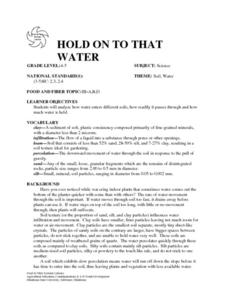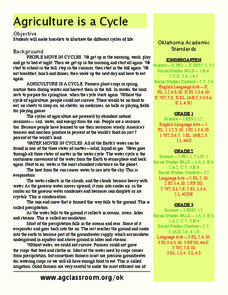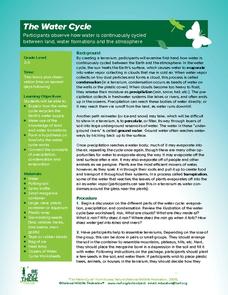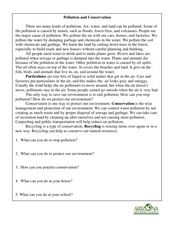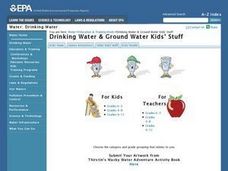Outside Education
Water Cycle Adventure
Evaporation, transpiration, condensation, precipitation, accumulation. Steam, clouds, rain, lakes. Guide your class members on an imaginary journey through the water cycle with a water cycle adventure script.
Virginia Department of Education
The Hydrologic Cycle
There is the same amount of water on earth now as there was when it was formed. The water from your faucet could contain molecules that dinosaurs drank! Young scientists build their own hydrologic cycle model and observe it for five...
Chicago Botanic Garden
Introducing Ecosystem Services
Purifying air and water, providing soil in which to grow crops, and moving water through its natural cycle are all services an ecosystem provides that benefit humans. Lesson four in a series lets learners explore and discuss the value of...
Curated OER
The Rock Cycle
Third graders, in groups, examine soil samples with magnifying glasses. They discuss the living and non-living things they find in their soild samples.
Curated OER
HOLD ON TO THAT
Students will analyze how water enters different soils, how readily it passes through and how much water is held.1. Materials needed for the activity are; pint of clay, pint of sand, pint of loam, newspaper,
three frozen fruit juice...
Curated OER
WALK, DON'T RUN
1. Bring two quarts of moist soil, a cake pan, a sprinkling can of water and a quart of grass clippings to class.
2. Share background material, and introduce the word "erosion."
3. Prepare a small model hill by mounding the soil in the...
Curated OER
Agriculture is a Cycle
Students explore cycles in nature. In this cross curriculum agriculture lesson, students define "cycle" and research weather and planting folklore. Students make a bracelet in which individual colored beads represent the many "cycles" of...
Curated OER
Plants In Space
In this biology instructional activity, students grow corn plants in growth pouches as the control group in an experiment on plant growth in microgravity. Then they analyze any differences that occur between Earth-grown and space-grown...
Curated OER
Carrying Capacity of Ecosystems
Students define population and carrying. In this algebra instructional activity, students explore exponential growth and decay based on animals and things that grow or decrease exponentially. They graph their findings and discuss their...
Calvin Crest Outdoor School
Survival
Equip young campers with important survival knowledge with a set of engaging lessons. Teammates work together to complete three outdoor activities, which include building a shelter, starting a campfire, and finding directions in the...
American Museum of Natural History
Bio-Benefits
Kick-start a discussion of the importance of biodiversity with a colorful resource that touts the benefits of maintaining healthy ecosystems. The images stress the interdependence of all the elements of an ecosystem.
Curated OER
The Water Cycle
Students are introduced to the components and importance of the water cycle. They are shown how groundwater moves using a model. Students list 9 places on earth where water is found. They define the terms cycle and water cycle.
Curated OER
Understanding Groundwater & the Effects of Pollution
Middle schoolers complete a unit on the effects of pollution on our water supply. They create a graph to examine the density of earth's land surface, round the population to the nearest hundred million place, participate in a...
Curated OER
Pollution and Conservation
For this pollution and conservation worksheet, students read a passage on pollution and conservation, and answer short answer, multiple choice, and vocabulary matching questions. Students complete 27 questions.
Curated OER
Water Cycle Adventure
Students take an imaginary journey through the water cycle. In this water cycle lesson, students identify the various parts of the water cycle, listen while their teacher leads them on an imaginary journey through the water cycle, and...
Curated OER
Watercycle
Third graders examine the natural circulation of water from oceans, lakes, and rivers to evaporation into the air, and then to condensation to produce rain falling back to the soil as components of the water cycle.
Curated OER
Groundwater Flow Demonstration Model
Students investigate the concept of groundwater that includes aquifers, groundwater flow, and the water table. They participate in activities using a flow demonstration model. Its use engages all types of learners because of its hands on...
Curated OER
Photosynthesis
In this photosynthesis worksheet, learners are given a diagram of photosynthesis and words that correlate with the process. They use the words to fill in the blanks about the process and the structures involved in photosynthesis.
Forest Foundation
The Sustainable Forest
As part of their examination of forest ecosystems, class members examine how foresters, biologists, botanists, geologists, and hydrologists work to together to develop a management plan for sustainable forests.
Forest Foundation
Forest Watersheds
Where does the water we use come from? To understand the concept of a watershed, class members study the water cycle and then engage in an activity that simulates a watershed.
Rhythm Rhyme Results
Whatʼs the Same and Whatʼs Different?
Learn about radiation, convection, and conduction with a multiple choice worksheet. Each question prompts kids to decide what is different about each form of heat energy transfer, and what is the same.
K12 Reader
Ecosystems
Examine how living and non-living things work together in a reading passage about ecosystems. Class members read the text and then respond to five response questions that relate specifically to the content of the passage.
Curated OER
TRANSPIRATION IN PLANTS
Students define the hydrologic cycle, define transpiration, name the three parts of the hydrologic cycle, and record the amount of moisture given off by several green plants.
Curated OER
Youth Activity: How People Get Their Water Reservoirs: "Holding Tanks" for Drinking Water
Students experience and participate in "Riding the Water Cycle" with this lesson. They explore, analyze and study the role of reservoirs in maintaining a reliable supply of drinking water. Each student constructs a model of a reservoir.






